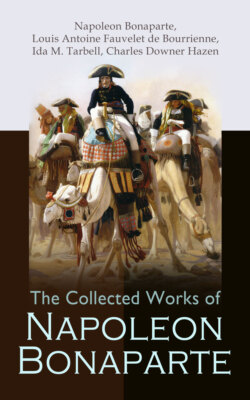Читать книгу The Collected Works of Napoleon Bonaparte - Charles Downer Hazen, Louis Antoine Fauvelet de Bourrienne - Страница 24
На сайте Литреса книга снята с продажи.
ОглавлениеMAXIM XIX.
Table of Contents
The transition from the defensive to the offensive is one of the most delicate operations.
NOTE.
By studying the first campaign of Napoleon in Italy, we can learn what genius and boldness may effect in passing with an army from the defensive to the offensive. The army of the allies, commanded by General Beaulieu, was provided with every means that could render it formidable. Its force amounted to eighty thousand men, and two hundred pieces of cannon. The French army, on the contrary, could number scarcely thirty thousand men under arms, and thirty pieces of cannon. For some time there had been no issue of meat, and even the bread was irregularly supplied. The infantry was ill clothed, the cavalry wretchedly mounted. All the draught-horses had perished from want, so that the service of the artillery was performed by mules. To remedy these evils, large disbursements were necessary; and such was the state of the finances, that the government had only been able to furnish two thousand louis in specie for the opening of the campaign. The French army could not possibly exist in this state. To advance or retreat was absolutely necessary. Aware of the advantage of surprising the enemy at the very outset of the campaign by some decisive blow, Napoleon prepared for it by recasting the morale of his army.
In a proclamation full of energy, he reminded them that an ignoble death alone remained for them, if they continued on the defensive; that they had nothing to expect from France, but everything to hope from victory. “Abundance courts you in the fertile plains of Italy,” said he; “are you deficient, soldiers, in constancy or in courage?” Profiting by the moment of enthusiasm which he had inspired, Napoleon concentrated his forces in order to fall with his whole weight on the different corps of the enemy. Immediately afterward, the battles of Montenotte, Milesimo, and Mondovi, added fresh confidence to the high opinion already entertained by the soldier for his chief; and that army which only a few days ago was encamped amid barren rocks, and consumed by famine, already aspired to the conquest of Italy. In one month after the opening of the campaign, Napoleon had terminated the war with the King of Sardinia, and conquered the Milanese. Rich cantonments soon dispelled from the recollection of the French soldier the misery and fatigue attendant on this rapid march, while a vigilant administration of the resources of the country reorganized the materiel of the French army, and created the means necessary for the attainment of future success.
